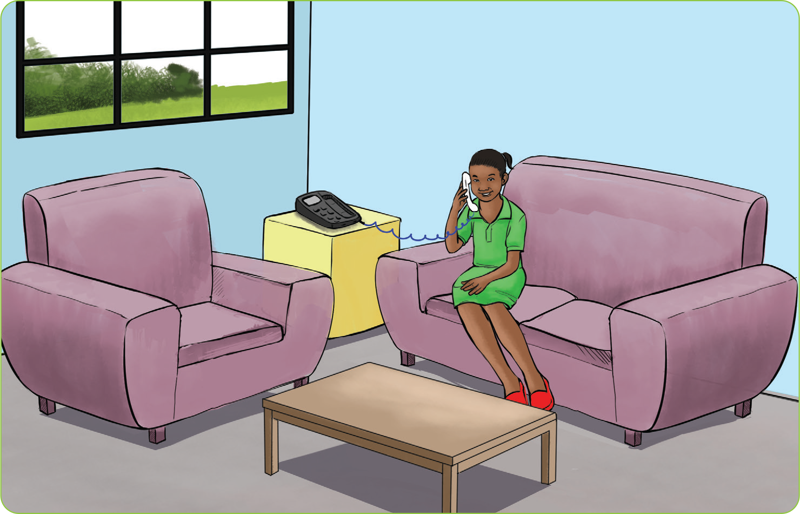Take Off
Discuss in a group the rights that every human being should enjoy. What should you do if your rights are denied?
Discuss in a group the rights that every human being should enjoy. What should you do if your rights are denied?
Akinyi: | Hello. May I speak to Mr Ekuam? |
Ekuam’s | May I know who is calling please? |
Akinyi: | My name is Akinyi. |
Ekuam’s Secretary: | Hello, Akinyi. Mr Ekuam is in another office. Let me put you through to him. There you are. You can speak to him now. |
Akinyi: | Good morning, Mr Ekuam. I am Akinyi, the daughter of your friend, Okelo. Thank you for taking the time to speak to me. |
Mr Ekuam: | Good morning, Akinyi. I am delighted that you have called. How are you and how is your family? |
Akinyi: | All of us are doing well, thank you. I hope you are fine too, sir. |
Mr Ekuam: | Yes, I am very well, thank you. Now, how may I help you? |
Akinyi: | Our teacher has asked us to find out what human rights are. Since you work with a human rights organisation, I thought you could help me. |
Mr Ekuam: | That is an important subject. Every person is entitled to certain things regardless of nationality, race, religion, ethnic group or social class. Can you guess some of these things? |
Akinyi: | Let me try. I think everyone should have food, shelter and clothing. |
Mr Ekuam: | You are right. In addition, every person has a right to life, education, health care and freedom. No one should deny you these rights. |
Akinyi: | I now understand. Thank you very much, Mr Ekuam. |
Mr Ekuam: | You are most welcome, Akinyi. Human rights is a broad subject.You can search for more information on the Internet. |
Akinyi: | I will. Goodbye and thank you once again. |
Mr Ekuam: | Goodbye, Akinyi. |

A | B |
Hello. | Hello. |
Listen to the video clip the teacher will play for you. Then in pairs, list the polite expressions used.
Neema: | Hello. May I speak to Furaha, please? My name is Neema. |
Musa: | Hello, Neema. I am afraid Furaha is not in the office at the moment. My name is Musa, Furaha’s colleague. |
Neema: | Hello, Mr Musa. Could you please pass a message to her when she returns? |
Musa: | I shall be glad to do so. |
Neema: | Furaha has been intending to interview a human rights lawyer.Tell her that my uncle, who works for the United Nations Human Rights Commission, is visiting us on Saturday. |
Musa: | At what time will your uncle arrive? Where do you live? |
Neema: | He will come at noon and will stay until evening. |
Musa: | Excuse me, where is your home? |
Neema: | Pardon me, I forgot to say. We live near Ruai on Kangundo Road. In fact, Furaha has been to our home many times. |
Musa: | All right, Neema. I shall tell Furaha that your uncle who works at the United Nations Human Rights Commission is visiting you in Ruai on Saturday from midday. She can plan to interview him then. |
Neema: | That is correct. Thank you very much. It has been nice talking to you, Mr Musa. Goodbye. |
Musa: | You are welcome. Goodbye, Neema. |

Imagine your cousin Ben called to talk to your sister Mutanu who has been sent by your mother to the market. He wanted your sister to accompany him to the library in the nearby shopping centre. Take down the message that your cousin wanted to convey to her. Use the format of the message you have just studied.
Share with family members what you have learnt about telephone etiquette.

What would you like to do with the text? The text is processed by artificial intelligence, it is not checked or edited! The text may contain errors. Check the accuracy of the text against the original text in the textbook.
Choose the files you want to add. Supported formats are txt, html, htm, pdf, odt, odp, ods, xls, xlsx, ppt, pptx, pps, doc, docx, rtf, png, jpg, jpeg and gif.
| Name | |
|---|---|
| remove |
NB! Links must begin with: “http://”!
Opiq uses essential cookies to make our website work, to help keep you safe, to analyse user interaction and to improve user experience.
Cookie is a small file which is sent from users computer to the website server. It includes necessary information for the website to operate and includes information about the user and their preferences.
Most of the cookies are necessary for the operation of Opiq. It is possible to deny analytical cookies and in that case your usage data is not used to develop and improve Opiq services. Read more